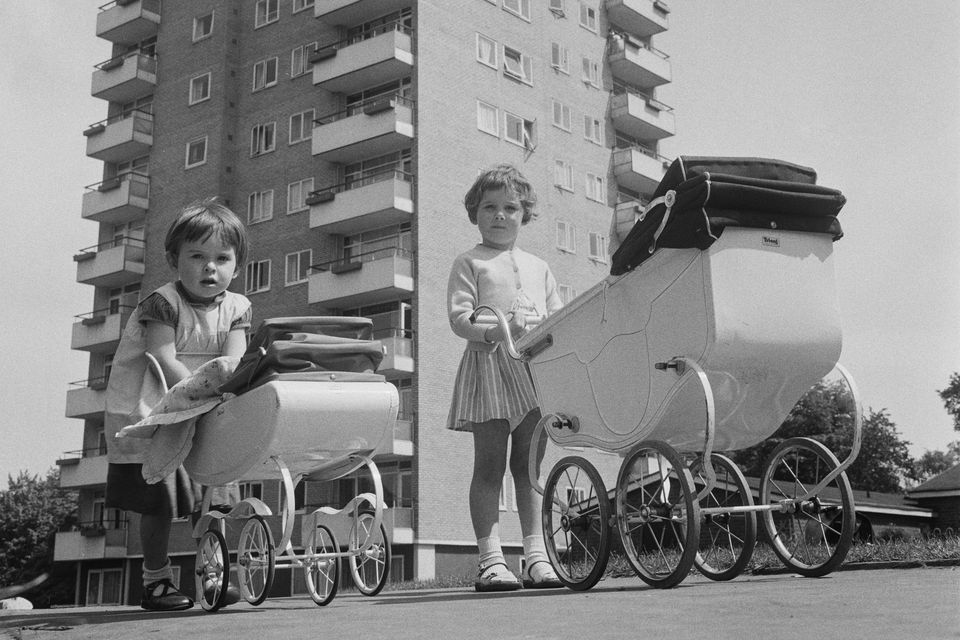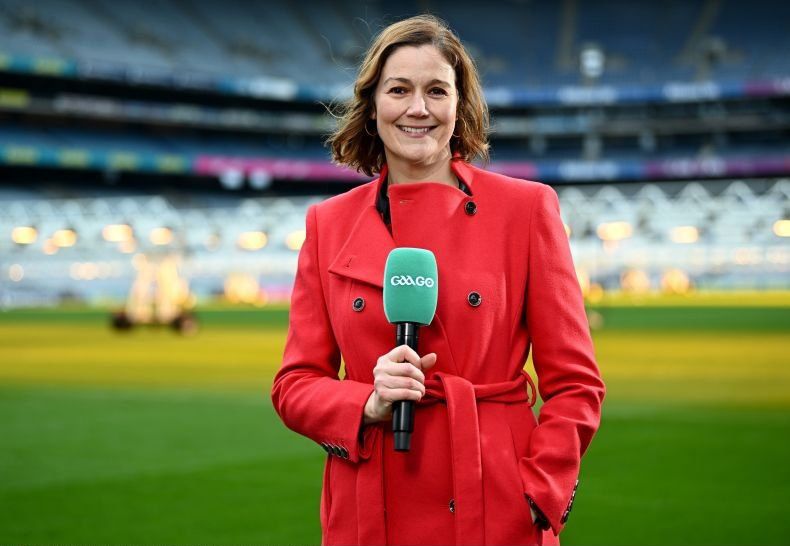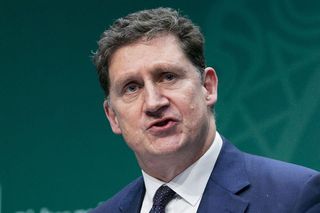Letters: Recalling those carefree days when children made own fun
Little girls play with prams in the early 1960s. Photo: Getty
Sir — I was recently booked by my 10-year-old granddaughter to take part in her school project — interviewing a grandparent to learn what life was like in their childhood compared with today.
Honoured to be the chosen one, I wanted to give it my best shot. I reflected on how best to represent growing up in the 1950s and 1960s so my street credibility would be maintained with this very important person in my life.
The scene was set, the hot chocolate and some favourite confectionery were to hand. The killer interview began — my own Piers Morgan moment.
I explained that we had lots of things for free, fresh air in abundance and very little air pollution. I confirmed that no, not everyone had cars, so we were free to walk on safer roads and didn’t have to pay expensive gyms for exercise. Doing well so far.
At school, the subjects were similar to today’s, and while corporal punishment was the norm, I never got a slap from a teacher in primary school. My granddaughter didn’t ask about the nature of corporal punishment and I chose not to elaborate.
I said we didn’t have mobile phones, only certain people had landlines and television wasn’t a given in every house.
“What did you do for fun?” she asked. I said we played make-believe a lot and described the radio bulletins we emitted from our own station.
Without any fear of GDPR, we announced who we thought might marry who, who was nice to children and who wasn’t. This could take up a whole wet morning until the rain stopped and we could go out and create our own shop.
Her interest piqued at this revelation, but I explained that there weren’t real sweets, just small objects we had collected and covered in sweet papers. It was such an empowering feeling to be that shop owner for a few hours.
All the material required for this entertainment was totally free, I said. On other occasions we would play snap, and if Santa had been good, he would have brought us board games — snakes and ladders, ludo and more. So that was free too, in theory.
Not many families went on foreign holidays, I said, but we looked forward every summer to the influx of visitors from far-flung places like London and New York — wonderful accents, different clothes and some exotic-sounding names.
At the end of the interview, my dear granddaughter was happy she had completed her task. On reflection, I realised I had escorted her from the seemingly innocent time of Dana to the era of Bambie Thug.
Make what you will of that — but would I want to go back? Well, no.
Margaret Acton, Castleknock, Dublin 15
Pensioners trapped below the poverty line
Sir — I had an interesting conversation with an Irish pensioner in his late 70s regarding the reduction in weekly payments to Ukrainian refugees in state accommodation.
This man, who is supportive of their plight, said: “I worked for 52 years, paid all my taxes and PRSI, paid a mortgage, with interest rates at one stage reaching 17pc. I never had a holiday, and after 40 years I now own my own house, which I can’t afford to heat in the winter. I’m not receiving much more in my weekly state pension than what was being paid to Ukrainian refugees living in state accommodation.”
This man, like a huge percentage of pensioners, is living well below the poverty line. Maybe it’s time, with elections pending, for pensioners to start protesting, marching on Dáil Éireann or blocking the entrance to the Book of Kells at Trinity College.
The Government, which has a huge budget surplus, conveniently forgot the people who worked hard through the various recessions, tightened their belts and paid penal income tax rates of up to 65pc to keep the State afloat.
Brian Lube, Co Meath
Sinn Féin must come clean on immigration
Sir — Philip Ryan asks us a perplexing question (‘So, where does Sinn Féin stand on immigration?’, May 12).
Given that they are the main opposition party and the only likely alternative for real change for the 34th Dáil, it is important that they bring clarity on their actual policy, notwithstanding that they now seem to be a broad church of opinions.
Obfuscation won’t cut it when the far right are in the ear of their electoral base. Clearly, significant numbers of Sinn Féin supporters don’t agree with open borders where undocumented people are concerned, but then again, neither do Fianna Fáil or Simon Harris’s new-look Fine Gael, if they are really honest.
The Taoiseach doesn’t want tented encampments on our streets or canalsides or in parks while creating the impression of compassion towards the plight of asylum-seekers. As he said in his article in the same edition of your newspaper: “We have to help those in need and we cannot achieve that without rules-based systems that dismantle the criminal trafficking gangs.”
That sounds more like Rishi Sunak-speak to me, despite not seeing eye to eye with him on immigration flows through Northern Ireland.
However, Sinn Féin will find the immigration problem isn’t going away any time soon, so appeasing the electorate will have its challenges. They have made much political capital on the housing problem for Irish citizens, at the expense of the Government parties, but are sure to lose that support with their no-say immigration policy.
Aidan Roddy, Cabinteely, Dublin 18
Solve root cause and immigration will end
Sir — No more than Leo Varadkar before him, Taoiseach Simon Harris seeks to reassure the public that the international protection process is working more efficiently on foot of a massive increase in resources poured into the processing of claims.
However, similar to Leo, he has produced no reliable statistics to back up his claims and is remarkably quiet on the likelihood of appeals or judicial reviews frustrating the removal of those people who fail the process.
That is quite apart from the State having no detention facilities, apart from our overcrowded prisons. It says it all that the only statistic produced by the International Protection Office is the monthly application figures, and the March ones (1,821) were only released up on May 8.
It is also interesting that the Taoiseach says nothing about the Government belatedly waking up to the “pull factors” that draw people to our island on the edge of Europe. This is all very ironic as the two Catherine Day reports constantly quoted by all and sundry, especially by the Greens, failed to examine “pull factors” in any form.
As a former boss of mine used to say, don’t give me problems, give me solutions. But to come up with a solution, the root cause of a problem (in this case, 700,000 illegals in the UK and the failure so far of our asylum process to remove a reasonable number of the many who fail it) needs to be addressed.
Michael Flynn, Bayside, Dublin 13
Pay wall deprives us of great hurling epic
Sir — I grew up in the 1960s and went to a Christian Brothers school, where the highlight was playing hurling and football. Now, in the autumn of my life, I coach at two schools and my local club.
I was fortunate to attend the marvellous Cork v Limerick match last week. The scenes at the conclusion were a joy, with all the fans on the pitch cheering their heroes. It was wrong to put the game behind a pay wall, and the GAA must review this.
Pat Harrington, Douglas, Co Cork
Well done to GAAGO for a great service
Sir — May I congratulate GAAGO for superb commentary and analysis on the Cork v Limerick hurling game? It was well worth €12 to watch an enthralling game, complemented by superb analysis from Gráinne McElwain, ‘Bubbles’ O’Dwyer and Alan Cadogan.
Commentator Gráinne McElwain. Photo: Sportsfile
They gave an honest and insightful opinion of the game rather than the boring, barren analysis from RTÉ’s Sunday Game panel.
David White, Tramore, Co Waterford
Mary Banotti had the most perfect voice
Sir — My abiding memory of the late Mary Banotti is that she was the most perfect speaker I ever heard. No “ems” or “ahs” or “buts”. The diction was faultless always — clear-cut and precise.
Seán McCormack, Drogheda, Co Meath
Someone shut that window on the world
Sir — Dublin’s new live portal to New York has attracted attention for all the wrong reasons. It gives a very bad impression to people in the US who might wish to visit Ireland. Newspapers in New York are reporting vile and obscene conduct, which will do this country no good whatsoever.
We have some of the most immature people to be found anywhere in the world. They let themselves down when they behave inappropriately, but this time they are taking us all with them and casting Ireland in a very bad light.
Maurice Fitzgerald, Shanbally, Co Cork
Let’s pin the blame on the usual suspects
Sir — I wonder how long before the usual excuses will be trotted out to explain the buffoonish behaviour at the portal in Dublin.
Catholic guilt? Internalised trauma from the Famine? Low self-esteem? A legacy from English colonialism? The far right?
It would appear the saints and scholars legacy is firmly interred with O’Leary in the grave.
Aileen Hooper, Stoneybatter, Dublin 7
Name the new bridge to honour Tom Oliver
Sir — In July 1991, the Provisional IRA kidnapped, tortured and murdered Tom Oliver, an innocent farmer from Riverstown, Co Louth. He left behind a wife and seven children and a community that still feels his loss.
One journalist at the time said Tom Oliver had become a symbol of every family on this island whose lives have been destroyed by IRA violence, and that comment is no less true 33 years later.
The proposed bridge between Northern Ireland and the Republic, at Narrow Water, will be more than just a transport link. It will be a symbol of the unity of purpose of normal people on both sides of the Border, especially given its location in a place that saw one of the worst mass murders of the IRA campaign.
It will be a visible sign that good people will always prevail, that the self-appointed judges and executioners will never win.
It is time to commemorate all the victims of that violent period in history, to stand up for the good people and to tell the murderers and violent psychopaths that they represent nobody but their own bitter, blinkered view.
Politicians on both sides of the Border should unite in that common cause and name this new bridge after Tom Oliver. It would be a fitting memorial to a decent, honourable man.
John Mulligan, Boyle, Co Roscommon
Follow German lead on election posters
Sir — Once again we have the blight of election posters on our streets. Surely now is the time to follow the example of Germany, where neighbourhoods have a dedicated area for a modest display of election material. This has been the norm for many years, and no party can claim advantage or disadvantage.
I won’t be so bold as to suggest we adopt another German electoral custom that I have experienced — the distribution of free beer while the respective political candidates discuss the issues of the day in a convivial and civilised way with the electorate. I don’t think Irish society is quite ready for that yet.
John Reidy, Leopardstown, Dublin 18
Sort the televoter aspect at Eurovision
Sir — Congratulations to Switzerland on winning Eurovision 2024. Well done also to our very own Bambie Thug on a very theatrical performance — reminiscent of Kate Bush — to secure sixth position. A more catchy melody might have taken the song even further.
My only qualm was that televoters could vote up to 20 times. This is a recipe for abuse and manipulation. The European Broadcasting Union should insist on one vote per televoter.
P J Mathews, Deepforde, Drogheda
Song contest lacks rhythm and lyrics
Sir — I’m 67. I rocked and rolled to Deep Purple, loved The Eagles, Joni Mitchell, The Band, Dylan and Steely Dan.
I watched Eurovision with an ever decreasing belief that I was watching a song contest in any shape or form. I know I’m out of touch, but that’s it: I will not be watching it again as it has no relevance to me or my understanding of rhythm, sound and lyrics.
Each to their own, but I’ll just pop on my Stones album and reminisce about when they were considered outrageous.
Liam Tighe, Dublin 15
Sir – Your letter writer last week, Maurice Fitzgerald, hit the nail on the head when he said the Eurovision had turned into a theatrical stage performance. I’m watching the Eurovision since 1958 and it now has become a circus. But life has become a bit of a circus too.
Terry Healy Riordan, Kill, Co Kildare
O’Brien is wrong on chronic programme
Sir — Tony O’Brien’s recent commentary on the healthcare situation at University Hospital Limerick (Opinion, May 12) addresses crucial issues, but I must offer a different perspective regarding the Chronic Disease Management Programme in general practice.
As a general practitioner involved in this programme, I can confirm its significant positive impact on patient care.
Contrary to the implications of Mr O’Brien’s remarks, these structured biannual visits have not led to a decrease in the availability of routine or acute care in our practice. Instead, they enhance patient oversight, allowing us to address both chronic and acute issues effectively within the same consultations. These appointments often resolve issues that might otherwise escalate, necessitating emergency interventions.
Evidence shows that 92pc of patients enrolled in this programme are managed solely in the community, significantly reducing unnecessary hospital attendances. Furthermore, collaborative efforts by practice nurses, GPs and community specialist teams have led to a 16pc reduction in chronic disease hospital admissions between 2019 and 2023, compared with a 3.5pc decline in overall medical admissions during the same period.
Readmission rates for patients with chronic diseases have also seen a substantial decrease, dropping by over 23pc in contrast to a 5pc reduction for all medical patients.
These figures underscore the effectiveness of the Chronic Disease Management Programme in alleviating the burden on our hospitals and enhancing patient care. The rising numbers of emergency department attendances are more likely attributable to broader systemic challenges such as demographic shifts, heightened patient expectations and a complex medico- legal environment.
It is imperative to recognise the success of the programme in not only maintaining, but enhancing, patient care.
Dr Mark O’Kelly, Dublin 8
Shocked by lack of support for Ukraine
Sir — I’m stunned at the lack of student protests all over the world to the invasion of Russia into a peaceful Ukraine. Where are the bleeding hearts now?
Slava Ukraini.
Úna Heaton, Limerick
Young people our greatest treasure
Sir — David Quinn excoriates Laszlo Molnarfi and the students of Trinity College Dublin over their successful protests, which led the college to desist from investment in Israeli companies (Opinion, May 12).
He tells us that the Book of Kells is our “greatest national treasure” and should not be held to ransom, even proposing that it might be “returned to the Catholic Church”.
I would suggest that our greatest national treasure is our principled young people, who are highly unlikely to be returning in such a manner. The future would appear to be in good hands.
Bernie Linnane, Dromahair, Co Leitrim
Join the Irish Independent WhatsApp channel
Stay up to date with all the latest news
















